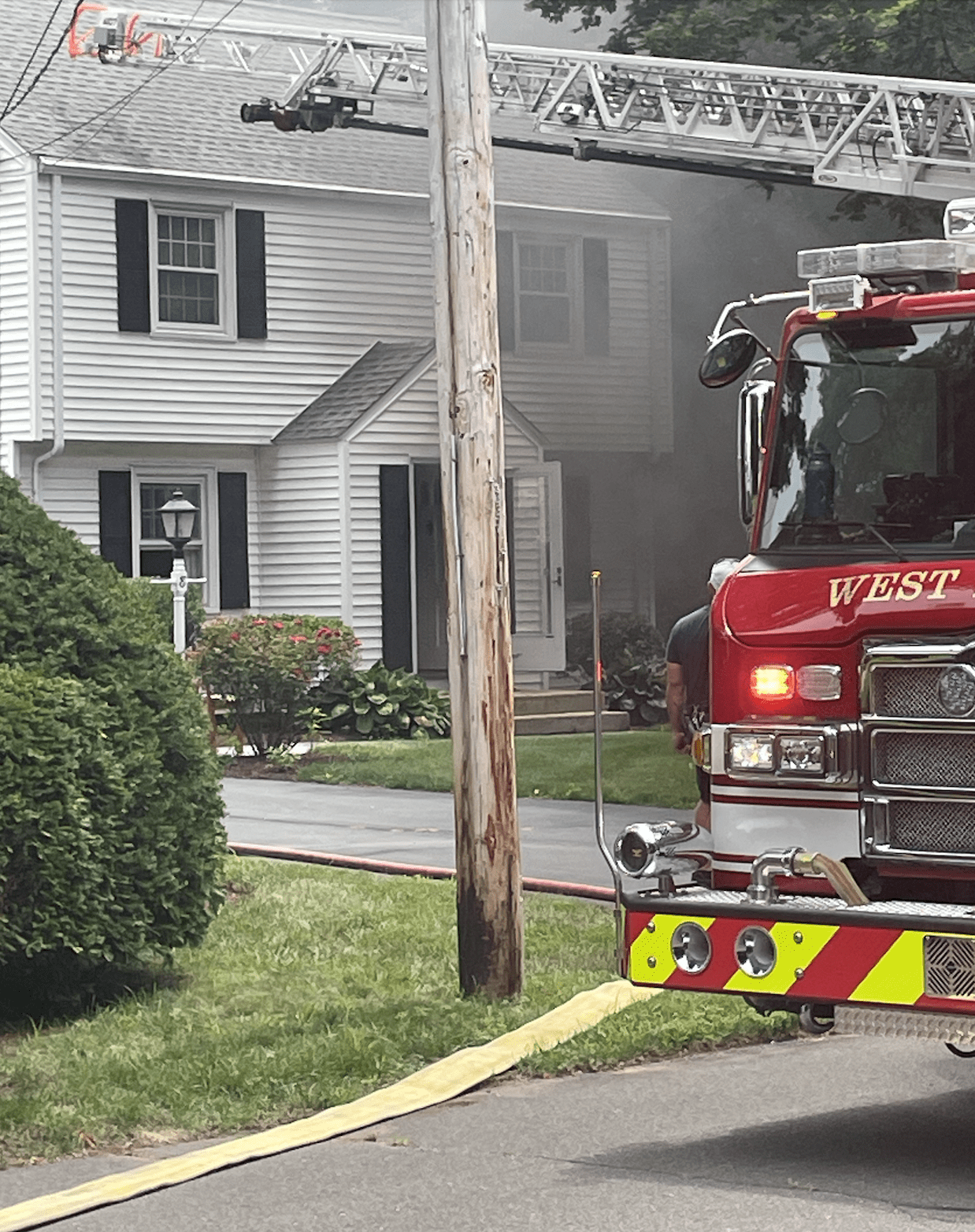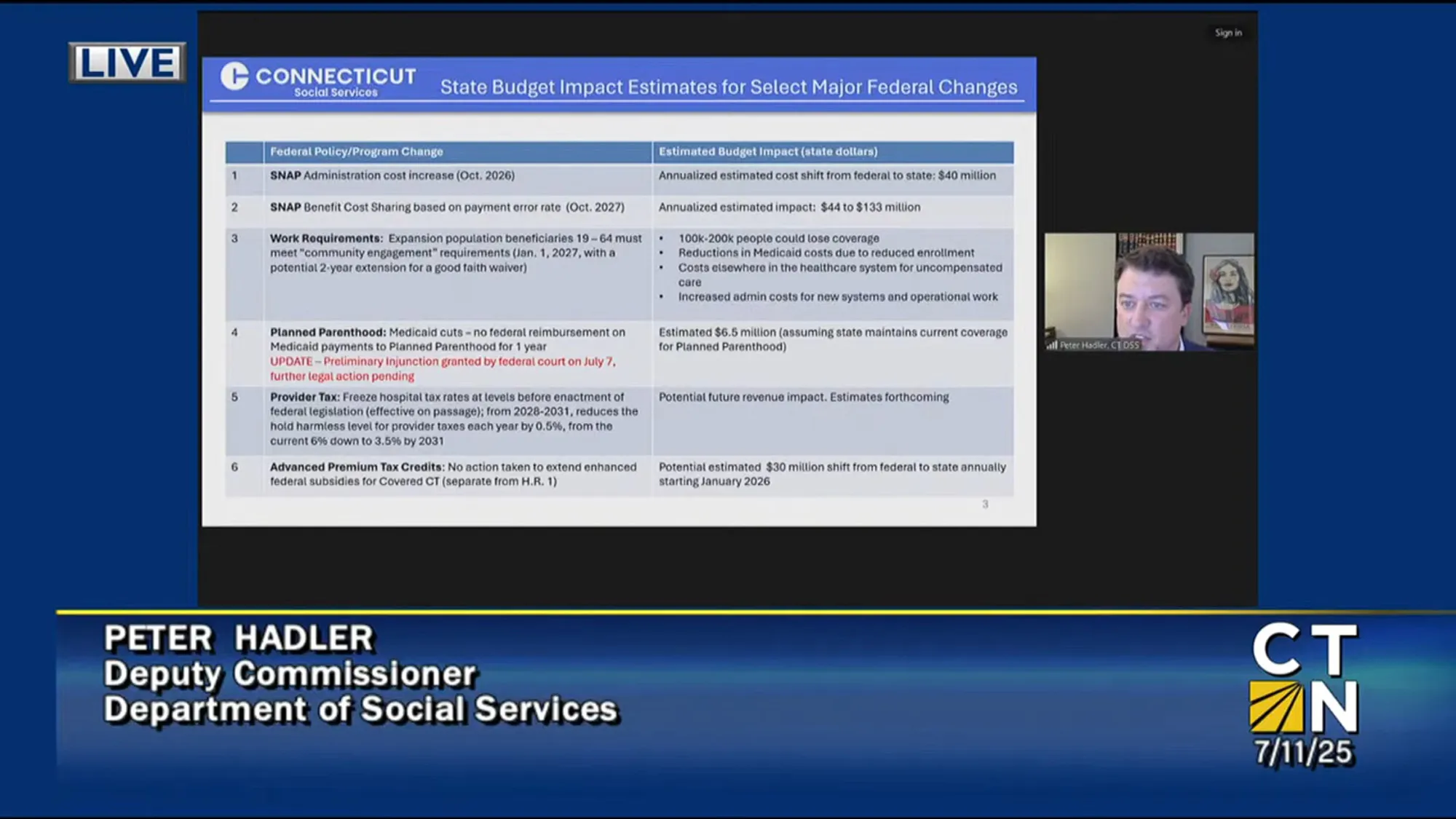Sitting Down with Archbishop Blair

Audio By Carbonatix
by Keith Griffin
Just moments into meeting Archbishop Leonard P. Blair, the newly installed head of the Catholic Archdiocese of Hartford, you like him. He’s a warm, engaging man along the lines of TV’s late Fred Rogers. Beneath that avuncular exterior, though, lies a strong intellect and deep commitment to his faith.
And it’s all delivered with a twinkle in his eye and a flat Midwestern accent that comes from having grown up in Detroit.
Archbishop Blair, who resides in town, sat down with West Hartford Magazine to talk about his role, the challenges of the Church, Pope Francis, and his limited free time.
In some respects, Archbishop Blair is like Pope Francis in that he was relatively unknown when he came here from the Toledo, Ohio diocese to replace Archbishop Henry Mansell who reached the mandatory retirement age of 75. Local Catholics are still curious about their new spiritual leader.
The Archbishop had this to say about the new Pope and his rock star popularity. “This is a two-edged sword, this popularity. On the one hand, the Pope has put his finger on some neuralgic points about how the Church is perceived, not only the Church, but the teaching of the Church. It’s a two-edged sword because some of his popularity is based on a misperception or false impression that somehow the Pope has any desire to change Church teaching on some very fundamental points that are very difficult for some people in the world today and they don’t accept. I think they’re going to be disappointed. I hope that doesn’t create some further difficulty,” the Archbishop said.
“Pope Benedict [the predecessor to Pope Francis] was a scholar, he was a theologian. He was a humble and rather shy man. Pope Francis is certainly not shy. Priests and bishops are not all cut from the same cloth and neither are Popes. We always pray God will give us the right man to be Pope for the times and each Pope makes his contribution. Now Pope Francis is making his and it’s very welcome,” Archbishop Blair added.
His humility is apparent when asked about his role as the CEO of the Archdiocese, which comprises Hartford, Litchfield and New Haven counties and includes approximately 700,000 Catholics out of the three counties’ population of 1.9 million. He’s an influential man yet doesn’t project that image.
“I know I have to be vigilant about the temporal goods of the Church. This means getting the very best people to administer these things. The buck stops with me as far as the ultimate responsibility but it wouldn’t be proper nor am I qualified to actually manage or administer all of these things personally,” said the Archbishop, who turned 65 on April 12.
But then his spiritual side comes to the fore as it does with everything he will discuss during the one-hour interview. “The chief role is to be a pastor of souls and principally as a bishop to be a teacher of the faith. That’s the principal job of the bishop as a successor of the Apostles to hand on with integrity the deposit of the faith, the faith of the Church in Christ. “There are many other things the bishop has to do be a spiritual leader and provide for the Church. But you have to appreciate being a teacher of the faith is the most important.”

Archbishop Blair also sees as a challenge the “great crisis of faith” facing his Church. “We speak of various programs and methodologies we’re trying,” he said, “to draw people back to church, to try to attract other people to join the Catholic Church. All these things are well and good as outreach. But ultimately in our society today what we are facing is a great crisis of faith. Many people question the need for religious practice as a member of a believing community that lives by an authoritative creed that includes moral teaching and sacramental worship. For many, religion is reduced to philanthropy–doing good, trying to be decent people and helping others materially. They think that the practice of faith, attendance at church, is not essential for happiness in this world or the next.
“So when it’s a question of what to do to bring people to church, it’s a combination of many things but mostly it’s a question of asking God to give people the gift of faith. Then, of course, on our part to make that gift of faith credible in their eyes, because we’re practicing what we preach. If we say join us, come to church, go to Mass, and then when we leave church we don’t act in a very edifying way, we contradict the Gospel. Young people in particular are quick to see any hypocrisy. Of course we’re all weak, we’re all sinful, none of us lives the Gospel perfectly, but we try with God’s help,” the Archbishop said. “And just as with the Judas the mystery of iniquity was at work even among the Lord’s own apostles, so now the scandal of iniquity can be found whenever the faith is betrayed, as in the tragedy of clerical sexual abuse.”
A touch of sadness comes to his voice when he posits that the crisis is driven by more than just a loss of faith. “A lot of the traditional ways that brought people together, for example, close family life and the extended family, neighborhoods—for Catholics all of these things revolved around the practice of the faith. Today family life is in crisis for many, and family and neighborhood ties aren’t what they used to be. All of these things make it more difficult to hand down the faith. So we have to work in new ways to create a sense of community,” he said.
“The personal element, personal contact will always be essential. It’s not just the Church but also other voluntary groups and organizations that are experiencing real challenges in bringing people together. Much of today’s society tries to go it alone. People have the mobility and the communications now, and often spend time on their cell phone rather than talking to the person next to them. That kind of thing is a challenge for all of us,” he said.
But then the Archbishop demonstrates he is not a man mired in the past. Technology can and is being embraced to help the Catholic Church in its mission. “We are very blessed to have excellent resources on the web today. All you have to do is Google something about the faith and you will find some very good Catholic resources for answering questions and getting guidance. Not that it’s any replacement for personal contact, but it’s a great resource,” he said.
The Archbishop embraces technology in his daily life – to a degree. “Most 10 year olds are more savvy than I am, but I do use the web, and actually get most of my news off the web– church or secular. I use it a lot for communications. I have my iPhone to communicate. But if there is anything lengthy to read, I find it hard to do so on a computer screen. I still have to print it out and read it.”
Another challenge for the Church is the education of children in the Archdiocesan schools – a challenge many parents find difficult because of the cost. There are 16,000 students attending the Archdiocese’s 53 schools, including nine high schools where 98 percent of graduates attend college. Catholic school students consistently test two grade levels above their public school peers.
“I acknowledge that the costs today are high and not everybody can do it. Catholic schools grew in the United States because immigrant Catholics came who were not well received by their Protestant fellow citizens. The public schools were basically Protestant and not very favorable to Catholicism. In the big cities, at least, the Catholic people made a great financial sacrifice to send their kids there so they’d get a really good education and also preserve their faith.
“I’m not saying our public schools are anti-Catholic today. Without prejudice to public education, which we all want to succeed, I hope that Catholic people would still be willing to make a sacrifice for the added dimension that the Catholic school can give. It’s always been a sacrifice.
“Ultimately we’ll only have Catholic schools to the extent that the Catholic parents are convinced of the importance of a Catholic education. That necessarily includes the religious dimension. In that sense it’s in their hands how well we will survive and flourish,” he said.

It’s a program run by Catholic Charities, which the Archbishop praised for its scope. “I was very impressed with the Hartford Archdiocese,” he said. “The Archbishop’s Annual Appeal, for example, is remarkably generous on the part of Catholic people. That includes a whole array of Catholic Charities outreach services and other charitable activities. Catholic Charities also gets grants and other support to conduct this work. It’s extremely important. Archbishop Mansell was fond of pointing out that after the federal government the Catholic Church is the largest provider of social services in the country.”
Archbishop Blair is a man who knows his limits and realizes the need to step back from the work that can easily swallow up all seven days in the week. “As a bishop or a priest, I always try to take a day off – one of the seven. I don’t have the weekends off so one of the seven. Some weeks it doesn’t happen,” he said.
Being outdoors is very appealing for him whether it’s walking or riding a bike. Those are the kind of things I do to unwind. A while ago the weather warmed up a bit and I took a ride down Route 44 to the reservoir for a long walk. Doing that, I unwind a bit. I think about the Archdiocese but not in a hectic way, and I don’t just think about work. We all need that.”
“I also love the water. I grew up around the Great Lakes in Michigan. I’m happy that Connecticut is near the Sound and the ocean and there are some nice inland bodies of water. I was attracted to the walk at the reservoir because of the water there. It is very peaceful on or by the water.
“The Lord said to keep holy the Sabbath Day. The Sabbath was meant to show among other things that everything doesn’t depend on us and our work. You have to give a day to God to show that ultimately things are in His hands. I’m not saying my day off is the Sabbath – far from it. But the idea of activism, that one has constantly to be doing things, it not healthy for the body or the soul.
“I realize that many of our fellow citizens are working very hard and don’t get any time off. Some are even pursued by their employers on the cell phone or web after hours and on holidays. I don’t think that’s a healthy thing.”
His humor comes through even when discussing his growing knowledge of the Archdiocese after four months as the archbishop. “When Father Romans, [then his secretary] and I are driving to various events, he often points out churches and some favorite restaurants to me. He claims that I seem to remember the restaurants better than the churches. Maybe that’s not a very edifying thought.”
To view the full magazine online, please visit our ISSUU library.



